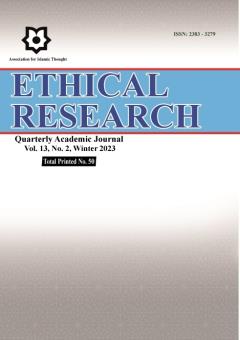Investigating the causes and motives of satire in Khaghani and Anvari poetry
Subject Areas : اخلاق و تربیت اسلامیhajar jowkar 1 , Maryam parhizgari 2 , Seyed Jafar Hamidi 3
1 -
2 -
3 -
Keywords: Genesis, Satire, Khaghani, Anwari, Psychology, Economics. ,
Abstract :
Satire is one of the branches of lyrical literature; in which the poet, for various Reasons and motives, slanders any annex that rivals or is hostile to him. The satire comes from the poet's resentment, enmity and neurosis; and because there are feelings and emotions in all human beings, all human beings are instinctively capable of satire and satire. This type of literature has been common in Persian literature and other nations. Various causes and factors such as psychological, material and socio-economic factors can play a role in its development. In this article, an attempt has been made to examine the satirical motives of two great poets, . Anvari Abivardi and Khaghani are both great poets of the sixth century whose poems contain many satires. The main question addressed in this research is, what were the causes and motives of satire in the poems of these two poets? The findings of this article indicate that in Khaghani's poetry the motives for satire are mostly psychological, personal and personal causes, and in Anvari's material material, personal and personal motives, psychological and sometimes social factors have been the reason for satir.
انوری ابیوردی، اوحدالدین، (1376)، دیوان اشعار، به تصحیح محمدتقی مدرس رضوی، چاپ دوم، تهران: انتشارات علمی و فرهنگی.
آلفرد، آدلر. (1376)، مفهوم زندگی را دریابید، ترجمه ناهید میرفخرایی. تهران: نشر کتاب.
حسن¬زاده نیری، محمدحسن ، (1395)، عقده¬ی برتری یا عقده¬ی حقارت؟ .اکاوی اشعار خاقانی بر اساس روان¬شناسی فردگرا، مجله متن پژوهی ادبی، سال 20، شماره76، صص. 85-106.
حلبی، علیاصغر ، (1377)، تاریخ طنز و شوخطبعی در ایران و جهان اسلام، چاپ اول، تهران: بهبهانی.
خاقانی شروانی، افضل¬الدین بدیل، (1382)، دیوان اشعار، به¬کوشش ضیاءالدین سجادی، چاپ هفتم، تهران: انتشارات زوّار.
زرقانی، سید مهدی، (1390)، تاریخ ادبی ایران و قلمرو زبان فارسی، تهران: سخن.
زرینکوب، عبدالخسین،(1357) ارسطو و فن شعر، تهران: امیرکبیر.
شولتز دوآن، سیدنی آلن شولتز،(1385)، نظریه¬های شخصیت، ترجمه یحیی سید محمدی، چاپ نهم، تهران، نشر ویرایش
صرفی، محمدرضا، (1388)، ابن رومی و انوری در عرصه هجویه¬سرایی، نشریه ادبیات تطبیقی دانشگاه شهید باهنر کرمان، دوره 1، شماره1، صص. 63-85.
صفا، ذبیحالله، (1367)، تاریخ ادبیات در ایران. تهران: انتشارات فردوس.
کاسب، عزیزالله، (1366)، چشم¬انداز تاریخی هجو، تهران: چاپ تابش.
محبتی، مهدی.(1392)، نقد ادبی در ادبیات کلاسیک فارسی،چاپ اول، تهران: انتشارات سخن.
مقدسی، محمد بن احمد، (1361)، احسن التقاسیم فی معرفه الااقالیم، ترجمه علینقی منزوی، تهران: کومش.
مؤتمن، زینالعابدین ، (1364)، شعر و ادب فارسی، تهران: بنگاه مطبوعاتی افشاری.
نیکوبخت، ناصر ، (1380)، هجو در شعر فارسی، تهران: انتشارات دانشگاه تهران.


